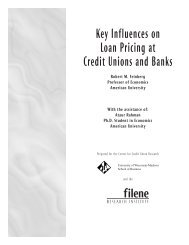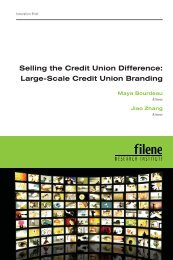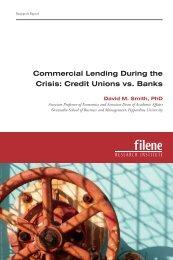Credit Union and Cooperative Patronage Refunds - Filene ...
Credit Union and Cooperative Patronage Refunds - Filene ...
Credit Union and Cooperative Patronage Refunds - Filene ...
Create successful ePaper yourself
Turn your PDF publications into a flip-book with our unique Google optimized e-Paper software.
union was unlikely to ever consistently redeem enough allocated<br />
equity to, at a minimum, redeem the equity of deceased members,<br />
the credit union should develop a communication plan that explains<br />
why no redemptions of equity could be made by the credit union.<br />
We expect that a significant part of that communication plan would<br />
be centered around the notion that the credit union provided significant<br />
benefits as a competitor in<br />
the market <strong>and</strong> that this alone<br />
The wisest approach would be to proactively manage expectations<br />
by educating members about what, exactly, they could union’s inability to redeem<br />
is enough to justify the credit<br />
expect from the credit union.<br />
equity on a regular basis. An<br />
aid to this plan is that most<br />
of the credit unions’ members<br />
would not pay income tax on these patronage distributions, because<br />
in most cases, the loans are for personal or family financing <strong>and</strong> not<br />
tax deductible to the member. Hence, the patronage income is not<br />
included in the member’s income, either.<br />
If equity redemptions occurred, we expect that the equity of the<br />
credit unions’ oldest members would be redeemed first. We also<br />
expect that the estates of deceased members would request redemption<br />
of equity. These credit unions are not obligated to redeem the<br />
equity. However, the wisdom of an education <strong>and</strong> communication<br />
plan to explain why the equity is not redeemed can easily be seen.<br />
If the equity is not redeemed, it would be assigned to the deceased<br />
member’s heirs, or the member’s estate could make a tax- deductible<br />
gift of the equity to a charity, perhaps to a 501(c)(3) owned by the<br />
credit union.<br />
Those members who obtain business loans from the credit union<br />
or who obtain real estate mortgages with tax- deductible interest are<br />
likely to pay tax on patronage distributions from the credit union.<br />
These members may be the most highly motivated to push the board<br />
of directors <strong>and</strong> management of the credit union to redeem their<br />
allocated equity. The argument of these members would be that a<br />
23% cash patronage refund is not large enough to pay the income<br />
taxes that they owe to federal <strong>and</strong> state governments. At present,<br />
under 501(c)(14), these members do not have that criticism, because<br />
under this exemption, the cash refund is the entirety of the income<br />
taxed by federal <strong>and</strong> state governments. Under Subchapter T, however,<br />
the credit unions’ business members would pay tax on both the<br />
cash patronage refund <strong>and</strong> the allocated equity used to distribute<br />
earnings to these members.<br />
These credit unions must be careful to manage members’ expectations<br />
about equity redemptions. If the income is allocated to members,<br />
members often expect that the equity will be redeemed sooner<br />
53








